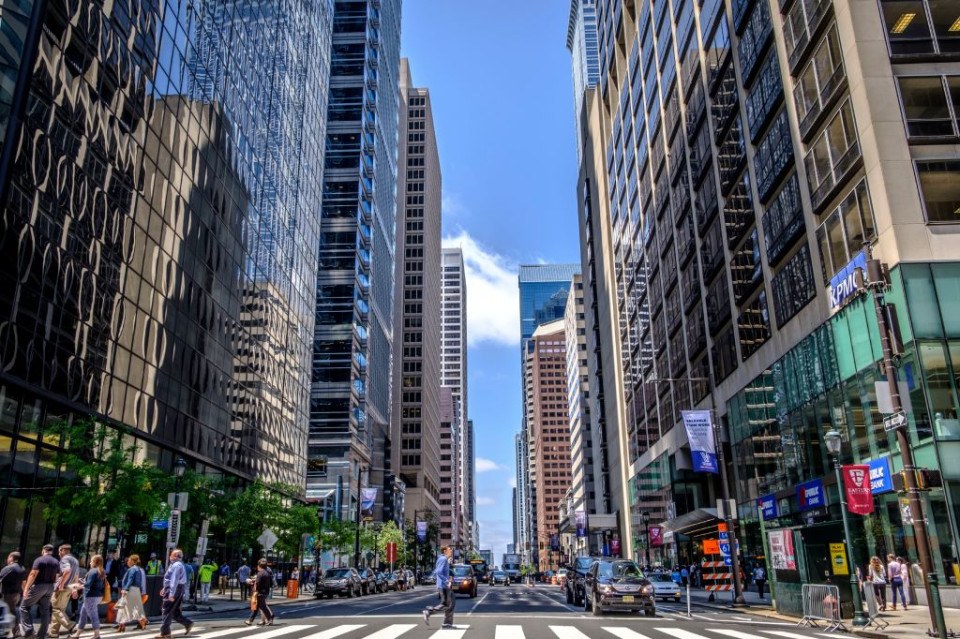There’s a Solution for Lifting People Out of Poverty In Philadelphia. Why Don’t We Try It?
Addressing one of the city's most persistent problems starts with a very straightforward premise.

Allan Domb says the way to address poverty in Philadelphia is by creating better jobs. Photograph by Jumping Rocks/Universal Images Group via Getty Images
A few weeks ago, the U.S. Census Bureau released a new set of figures about poverty in America. Unfortunately, the takeaway was one that’s all too familiar. Philadelphia remains the poorest large city in the United States, with 21.7 percent of our residents living below the poverty line in 2022.
While that number is a percentage point lower than 2021, it still represents 380,000 people who struggle daily to cover necessities like food, shelter, clothing and healthcare. What’s more, poverty impacts Black and brown Philadelphians disproportionately. A full third of Hispanic residents in Philadelphia — and a quarter of Black residents — live below the poverty line.
Over the years various well-intentioned efforts have been made to tackle poverty in our city, but in my opinion the majority of them are band-aids, not attempts at a cure. If we really want to lift tens, even hundreds, of thousands of people out of poverty permanently, the only way to do it is by creating better-paying jobs in Philadelphia. And we can only do that if we fix a tax system that drives businesses and entrepreneurs away — and leaves too many of our citizens struggling to keep their heads above water.
For businesses, the fundamental problem with Philadelphia is that our tax laws make it too expensive to operate here. Thanks to a city business tax rate of 5.99 percent and a Pennsylvania corporate tax rate of 8.99 percent, Philly-based businesses pay nearly 15 percent of their income in taxes. That’s not only the second highest rate in the entire country (only New York is higher), but our combined tax rate dwarfs those of peer cities like Boston (8 percent), Chicago (7 percent), Atlanta (5.75 percent) and Charlotte (2.5 percent). Our rate even towers over that of notoriously tax-happy San Francisco (8.84 percent).
Do companies have an obligation to pay their fair share? Of course they do. But if we ask them to pay more than twice as much as they pay in almost any other city, we’re being foolish — many businesses simply won’t locate here. And that’s what’s been happening for decades. We’re like a grocery store that charges twice as much for milk, eggs and bread as our competitors do, then can’t understand why customers keep passing us by for the store down the street.
The negative consequences of our high rates are real, and you see them most clearly in the lack of good-paying jobs being created by the private sector in Philadelphia. Of the city’s 20 largest employers, only four are private-sector companies. The rest are either nonprofits or government entities — which pay zero in business taxes. That’s not a coincidence.
Meanwhile, when we do create jobs in Philadelphia, too many of them simply don’t pay enough to lift people above the poverty line and into the middle class. Between 2009 and 2018, 29 percent of the jobs created in America were at the bottom end of the economic spectrum — paying $35,000 or less. In Philadelphia, it was 60.5 percent. Philadelphians are poor not because they don’t want to work, but because they too often have to toil at jobs that barely allow them to make ends meet.
Maybe the clearest example of the difference that tax rates make can be seen in our own suburbs.
Because they don’t have Philadelphia’s high business taxes, our neighboring counties have 40 percent more businesses per capita than the city does. That’s the biggest gap between city and suburbs of any metro area on the East Coast. Places like King of Prussia, Malvern and Conshohocken are bursting with good-paying jobs that, in my opinion, could and should be in the city — if our tax laws were smarter.
How can we fix this? The good news is, the state of Pennsylvania has already taken a helpful step. Last year, the state legislature passed a law that will gradually lower Pennsylvania’s corporate tax rate to a more competitive 4.99 percent by 2031.
Now it’s time for the city to do its part. In my final year on City Council, I worked on legislation that would have gradually reduced our business tax rate to zero over a period of 10 years. It’s time for our public officials to embrace such a plan.
Too often business tax cuts get framed as giveaways to the rich. In Philadelphia’s case, the exact opposite is true. Reducing our business taxes is the only way to permanently aid the people in our city who need help most.
Allan Domb served as an at-large member of Philadelphia City Council from 2016 to 2022. He will be contributing regular opinion columns to Philly Mag focused on big ideas for the city.


